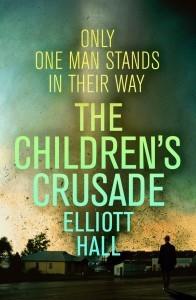Elliott Hall's Blog, page 8
May 19, 2011
They are drinking your milkshake
From Peter Wilby in the Guardian:
Now comes a report this week from the High Pay Commission, set up by the Labour pressure group Compass. It reveals that FTSE 100 chief executives are on average paid £4.2m annually, or 145 times the median wage – and on current trends will be paid £8m, or 214 times the median, by 2020. In the financial sector, even the CEO can seem modestly rewarded: this year, the top-paid banker at Barclays will get £14m, nearly four times the chief executive's earnings and 1,128 times more than the lowest-paid employee receives.
Meanwhile, once inflation is taken into account, most people's incomes are set to fall, after 15 years of virtual stagnation. Between 1996-7 and 2007-8, the earnings of someone in the middle of the income distribution rose (1997 prices) from £16,000 to £17,100 – barely £100, or less than 0.7% a year. Even the increase for those quite near the top of the income scale, better off than 90% of their fellow citizens, was unspectacular. Their inflation-discounted pay crept up from £36,700 to £41,500, or less than £450 (1.2%) a year. The top 0.1% scooped the jackpot. They got a £19,000 pay rise every year, taking their incomes to £538,600, a gain of 67% over 11 years. The commission gives no figures for the top 0.01%, but we can be confident they did even better and dramatically so.
That is the most important point about what has happened to incomes in Britain and America during the neoliberal era: the very rich are soaring ahead, leaving behind not only manual workers – now a diminishing minority – but also the middle-class masses, including doctors, teachers, academics, solicitors, architects, Whitehall civil servants and, indeed, many CEOs who don't run FTSE 100 companies, to say nothing of the marketing, purchasing, personnel, sales and production executives below them. That is why, over the past decade, some of the most anguished cries about high incomes and inequality have appeared in the Telegraph and Mail.
Keep these numbers in mind the next time you see a rag screaming about 'gold-plated' public sector workers. Their pay hasn't been skyrocketing like the top 0.1%, it's that the rest of society is getting robbed by that golden tenth. Willby thinks that, because fear of loss motivates people more than the possibility of gain, people are more worried about being overtaken by those below them than exploited by those above. I'd add that our culture has become so suffused with the ethics of the gambler that people would rather accept the unfair present than mess with the shining possibility the ultra-rich represent. Anybody could be a winner, after all, just ask the National Lottery.
Review of Children's Crusade in Lancashire Evening Post
"The Children’s Crusade is another rich, imaginative, superbly paced and action-packed ride which tackles weighty issues while still creating an atmospheric thriller in a landscape that is both troublingly familiar and yet fascinatingly alien."
http://www.lep.co.uk/lifestyle/book_r...
Jack Sparrow, Lonely Island
This amuses me, I have no other defense.
May 15, 2011
The People Vs. Goldman Sachs
The great and powerful Oz of Wall Street was not the only target of Wall Street and the Financial Crisis: Anatomy of a Financial Collapse, the 650-page report just released by the Senate Subcommittee on Investigations, chaired by Democrat Carl Levin of Michigan, alongside Republican Tom Coburn of Oklahoma. Their unusually scathing bipartisan report also includes case studies of Washington Mutual and Deutsche Bank, providing a panoramic portrait of a bubble era that produced the most destructive crime spree in our history — "a million fraud cases a year" is how one former regulator puts it. But the mountain of evidence collected against Goldman by Levin's small, 15-desk office of investigators — details of gross, baldfaced fraud delivered up in such quantities as to almost serve as a kind of sarcastic challenge to the curiously impassive Justice Department — stands as the most important symbol of Wall Street's aristocratic impunity and prosecutorial immunity produced since the crash of 2008.
Matt Taibbi at Rolling Stone has written a great article about the Senate's report into the financial crisis, a report that identifies both fraud on the part of Goldman Sachs and the fact that its CEO Lloyd Blankfein lied to Congress during testimony, I think the biggest reason major financial criminals haven't gone to jail — other than the fact that they've bought most of the senate — is that their crimes are both complex and banal.
So a smart, funny writer is exactly what the material needs:
— legalese mumbo jumbo that attempts to convince the ignorantly enraged onlooker that, according to American law, these grotesque tales of grand theft and fraud you've just heard are actually more innocent than you think. Yes, they will say, it may very well be a prosecutable crime for a corner-store Arab to take $2 from a customer selling tap water as Perrier. But that does not mean it's a crime for Goldman Sachs to take $100 million from a foreign hedge fund doing the same thing!
For all the talk of derivatives, synthetic CDOs, CDO-squared and other exotic financial products, all they were really doing was selling their clients pyrite and claiming it was gold. As long as the circumstances are confusing enough to obscure that simple fact, and as long as they own a controlling share in the government, the reckless gamblers who nearly destroyed the financial system will try to do it again.
May 11, 2011
Wednesday Exposition
The British Royal Family: Are they Assholes? – Matt Taibbi. A case before the Supreme Court of Assholedom.
Gambling in Macau now four times the size of Las Vegas – Guardian.
Overcrowded, overpriced and overrated: welcome to Britain – Independent.
Interrogation Experts From Every Branch of the Military and Intelligence Agree that Torture DOESN'T Produce Useful Information – Naked Capitalism.
Don't make any plans after the 21st. Those ads on the tube marking that day as the end of the world have started to show up in Canada. I recommend spending the next eleven days begging for mercy and chanting laments.
Finally, let's all pretend I'm not insanely excited about this:
May 9, 2011
Tough Guys, but only from a safe distance
From day one of the War on Terror (TM), it was clear that the Bush people reveled in the notion that they were tough guys, willing to Do What Needs to be Done. They were all wannabe Kiefer Sutherlands. Far from showing qualms about suspending the rule of law and using torture to extract information, they obviously enjoyed the idea that they were willing to go all the way, unlike those wimpy liberals.
In the lead up to the war there were always pundits puffing out their chests on TV, telling us to 'man up,' cheered on by assholes who couldn't catch a bus let alone Bin Laden. The most vocal pundits and war bloggers seemed to think that advocating a war was the same thing as fighting one.
Same went for the torture fetishists. That's why Jack Bauer – a fictional character – was namechecked in the Republican primary debates like he was some kind of policy expert. Tancredo and others basically said we need to be tough, like Jack Bauer. That toughness meant hanging people in stress positions to their joints swelled, throwing them against walls, abusing, starving, and drowning (there's nothing simulated about the drowning in water boarding) until they said what we expected them to, not what was true.
They came up with a bunch of other justifications, but that was the real reason. Fuck them over so people know not to mess with us. It was the mindset of a corner thug blown up into a foreign policy.
Ta-Nehisi Coates has more on when it's easy to be a tough guy.
May 7, 2011
Against the Man
An article I wrote about Noir and its love of sticking it to the Man is on Milo's Rambles:
When I began writing The First Stone in 2008, I had been watching America lose its mind from the safety of this side of the Atlantic for several years. The panic caused by terrorism and an ascendant religious right was a potent and frightening cocktail. I wanted to talk about that mixture of faith and authoritarianism, and I decided on the hard-boiled detective fiction of Dashiell Hammett and Raymond Chandler.
Noir might seem an odd choice at first. It's best known for witty one-liners, untrustworthy dames, and marble-mouthed gangsters. Next to the hoods and molls is another tradition just as important, one that's been around since Dashiell Hammett's Red Harvest: corruption. This is corruption not only of the personal kind, affairs and drug habits that are the bread and butter of any private detective, but the official corruption of the mobbed-up mayor and the dirty cop.
There's more goodness where that came from, so head on over and give Miles a hit (as in unique impression, not smack.)
This is the dimension of imagination. It is an area we call… The Twilight Zone.

Time Enough at Last
The Guardian pays proper respect to the Twilight Zone:
Watching The Twilight Zone today, it's striking how complex, satirical and thought-provoking it all is. While the tales include such fantastical imagery as a stopwatch that can stop time, department store mannequins coming to life, or a child whose dreams take corporeal form, you can clearly see that they're really about the early-60s: an era of race riots, assassinations, crooked politicians and the Vietnam war, when communism and nuclear bombs were palpable fears. People were confused, scared and paranoid, yet so little of the television of the time reflected this mood. Sponsors, executives, salesmen and producers were in charge of the networks and they didn't want viewers distracted by big issues when they should have been thinking about what products to buy. It was in this climate that 34-year-old writer-producer Rod Serling devised The Twilight Zone. After having almost all the contemporary political references excised from an early drama about a crooked senator, he hit upon the idea of using science fiction and fantasy to smuggle in more controversial elements, in plain sight of the moneymen.
The Twilight Zone is science fiction at its best. It took contemporary themes like nuclear annihilation, themes that could not be discussed publicly, and went at them from a different angle. Serling reshuffled the pieces of reality to show a distorted, but still recognizable, reflection to society. Going directly at something like Soviet paranoia triggers learned responses in an audience, decisions they've made about the world that are now set and part of their beliefs. If the 'Soviets' are transformed into aliens, as in one of my favourite episodes, The Monsters Are Due on Maple Street, viewers give themselves the freedom to look at things differently.
The best contemporary example of this was Battlestar Galactica. Ronald D. Moore took an eighties TV show about space battles against robots (starring Face, no less) and turned it into a meditation of terror and security policy. How many shows on American television do you think could get away with one of the main characters organizing the suicide bombing of an occupying forces' police graduation ceremony in the middle of the Iraq insurgency?
I think Battlestar also perfectly illustrates the hurdles science fiction faces to live up to this part of its legacy. Ask the average person about science fiction, you get Star Wars, lasers and alien chicks of proportions unlikely in any species. This is the most profitable version, so it's the one that's pushed most often. Not to get all nerd-snob, but these aren't science fiction in any real sense, just westerns, fantasies and thrillers that happen to be set in the future.
I nearly fell afoul of this in The Strange Trilogy. Like Serling I wanted to twist reality to draw out some of its threads, in my case religious fundamentalism, security policy, and the various ways people murder one another over abstract ideas. However, as soon as I said it was in the future, even the very near future, people began to expect laser pistols.
May 5, 2011
The End Has Come
PI Felix Strange is working his last case. The woman he loves has been taken by Fisher Partners – America's for-profit secret police – and, though he suspects he won't find her, he's going to do the next best thing: kill everyone involved.
As he works his way down the list, Strange is offered a secret deal, which could lead him straight to Iris. Across the American South, the militant Sons of David are on the rise. Their leader, the prophet Joshua, promises a new world to replace the sinful old.
To free Iris, all Strange has to do is assassinate this new messiah.
The problem? He's twelve years old.
May 4, 2011
Wednesday Exposition
This week's exposition is going to be Osama-heavy:
The usual suspects are again saying the death of Bin Laden magically justifies torture and the other crimes committed by the Bush administration, and vindicates the decision to continue indefinite detention under Obama. Glenn Greenwald pushes back.
The NY Times account of the hunt.
A good article in The Atlantic on how much uncertainty has swirled around the operation.
Juan Cole expands on this with Top Ten Myths about Bin Laden's Death (I doubt Letterman will be using this one.)
Rather than interview a beltway hack who gets all excited about the idea of drowning someone, Rachel Maddow brings on someone with actual experience in interrogations:
Visit msnbc.com for breaking news, world news, and news about the economy
To make you feel better after all that, here is The Bible in LOLCat. Decline of civilization, et cetera…




